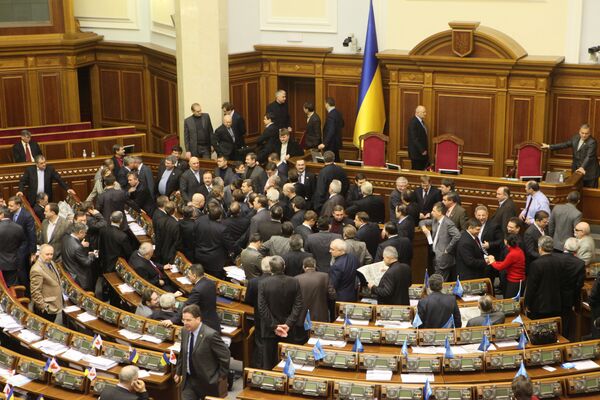KIEV, January 28 (RIA Novosti) – Ukraine’s parliament is expected Tuesday to repeal legislation passed earlier this month that sparked the violent escalation of largely peaceful protests.
Officials in the former Soviet country said last night that an agreement had been reached with opposition leaders to review a bundle of anti-protest laws in an extraordinary session of Ukraine’s parliament, the Verkhovna Rada.
The unpopular legislation limiting the rights of protesters was pushed through the Rada on January 16 by the ruling Party of the Regions without any formal debate amid scenes of chaos.
Ukraine’s justice minister announced the legislation review after talks between President Viktor Yanukovych and three opposition leaders, in an apparent bid to placate protesters who have been camped out in central Kiev since the government decided to back off from signing a series of agreements with the EU in November.
Up to five people have been killed in over a week of violence that began with clashes between riot police and demonstrators in downtown Kiev on January 19.
Opposition leaders Vitali Klitschko and Arseniy Yatsenyuk earlier rejected another apparent concession offered by Yanukovych when both men declined offers to join the Ukrainian government.
It was not immediately clear which parts of the bundle of anti-protest legislation, which was criticized internationally and dubbed a “charter of oppression” by Amnesty International, would be repealed Tuesday.
Ukrainian Justice Minister Olena Lukash said in a statement Monday that laws that do not encounter serious opposition will be passed again, while the rest will be invalidated after agreement between the major parties.
The original laws passed by the parliament and signed by Yanukovych stipulated 15-day jail sentences for those taking part in unsanctioned demonstrations and prison terms for those wearing helmets or masks during rallies, or erecting makeshift structures without approval from city authorities.
The measures also included new restrictions on Ukrainian NGOs apparently modeled on a similar law passed by Russia in 2012, restrictions on the Internet and harsher punishments for extremism.


